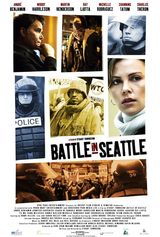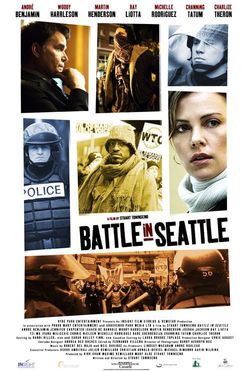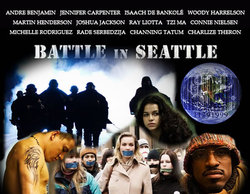
2008-11-21
Review: Battle in Seattle
Before the World Trade Organization met there in 1999, Seattle's central claim to fame was the Starbucks Coffee chain and seminal grunge rocker Kurt Cobain.
Shortly after the WTO meetings were disrupted by riots and violent clashes between protesters and police, the little Emerald City on Puget Sound became a case example for the new realpolitik--where ordinary people, and not a proclaimed enemy of the state, suddenly became suspect in the eyes of lawmakers and politicians.

The Battle in Seattle sparked endless debate around the world, and successfully polarized the population at large as citizens found themselves torn between images of riot police using truncheons on unarmed women, and black-masked activists throwing bricks through store windows--for no apparent reason at all.
In Stuart Townsend's long-shelved movie about the week of blood and stones, the headlines are brought down to human scale as the actor and boyfriend to Charlize Theron writes and directs a multi-pronged narrative that depicts both sides.
Front and centre are Dale (Woody Harrelson) and Ella (Theron). Dale is a well-respected and well-behaved police officer. His wife Ella is expecting their first child. Neither one of them has strong political feelings one way or another, but when Ella is accidentally caught up in a protest, and gets a police baton in the belly, things start to look awfully personal to Dale. Standing squarely on the "other side of the law" are a group of well-intentioned protesters--including Django (Andre Benjamin), Lou (Michelle Rodriguez) and Sam(Jennifer Carpenter) -- looking to raise awareness about the trade organization's global agenda.
Watching over the whole mess from his corner office is Mayor Jim Tobin (Ray Liotta), a city politician who was all too happy to entertain the world media and enjoy ancillary revenues until the photo ops turned ugly.
Thanks to some excellent character work from the ensemble, we believe these people exist--but always at Townsend's convenience. In other words, these character "types" have been carefully selected to articulate certain points of view, and certain rhetorical phrases.
After all, what would a protest movie be without a call to action and a reminder that ordinary citizens are the only check against government and corporate malfeasance?
The minute you walk into the theatre, you know someone will raise a fist and chant a divisive slogan. By the same stretch of formula, we also know some peace officer in riot gear will do something cowardly and inhumane.
It's the way these things work, and as commendable as Townsend's decryption of the system is, it always feels just a little too simplistic in its approach.
It's not the substance of the debate that Townsend dumbs down in this Vancouver-shot reel, but the emotional and moral complexity of the issues.
The characters feel real and believable, but they also feel incredibly shallow and narrow-minded because they have no ability to move outside their own comfort zone, which limits their chances at transformation--and the movie's hopes for dramatic fulfilment.
The movie isn't a writeoff. It still tells a compelling story and brings the viewer into the detailed chaos of a watershed moment.
Yet, if Townsend was hoping to inspire the masses with this fiery message movie, he would have done well to include a few more characters into his political collage--namely, a typical American family with two kids, a minivan and a love for escapist entertainment.
We needed a baseline touchstone for the action. Not only would it have been more accessible to the mainstream viewer with a Joe and Jane Average in the mix, it probably would have been more effective, too, because nothing changes until change hits the Everyman at home.

